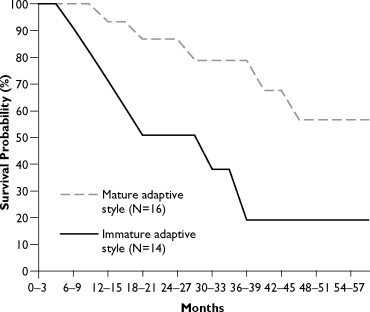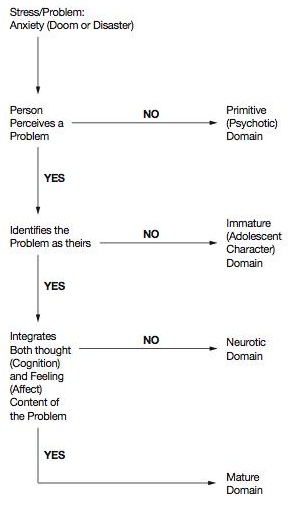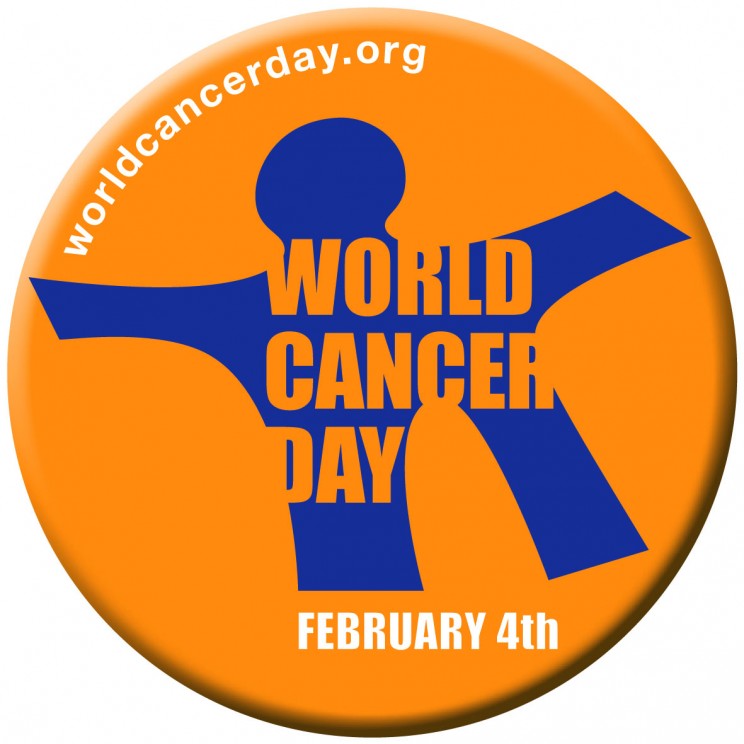By Thomas P. Beresford, M.D.
Psychological treatment studies that did not measure the maturity of psychological adaptive mechanisms in cancer patients have reported conflicting cancer survival results. Widely publicized studies noted increased survival rates among cancer patients who underwent psychotherapeutic treatment. However, more recent multicenter study could not replicate improved survival after behavioral treatment, and other studies have reported similarly conflicting results. Since published reports suggest that patients likely to benefit from psychotherapies are generally those with the most psychological maturity, it seems possible that the underlying health of psychological adaptive mechanisms may be related to cancer survival.
To our knowledge, prior to our 2006 report, psychological adaptive mechanism maturity had not been considered as affecting cancer survival either in behavioral-treatment studies or in trials of antidepressants. In that report we used measures of both depression symptom frequency and psychological adaptive mechanism maturity to assess what, if any, relationship each bore on survival probability in cancer patients. On the basis of previous studies of depression and ego-adaptation, we believed that “Immature” adaptive styles and frequent depression symptoms would independently predict lower survival rates. Then we studied 86 consecutive, mostly late-stage, cancer outpatients for up to 5 years; their survival data were analyzed in relation to the Beck Depression Inventory (BDI) and the Defense Style Questionnaire (DSQ) scores at study entry. Cumulative survival probability curves contrasted the extreme cases: the most (N = 15) to the least (N = 21) depressed, and the “immature” (N = 14) to the “mature” (N = 16) adaptors. Depression did not separate the groups until 30 months after diagnosis. (Figure 1)

Figure 1: Five-Year Cumulative Survival Probability by Maturity of Adaptive Styles
Psychological adaptive mechanism (ego defense) style separated them at 8 months; by 18 months, the Immature survival probability had dropped to 50%, versus 87% for the Mature. At 36 months, survival probabilities were 19% and 57%, respectively. This study suggested further clinical attention toward psychological adaptive mechanism maturity and immaturity as a potentially strong indicator of distress and lowered survival in cancer patients. It also indicated that the maturity of adaptive mechanisms must be taken into account in both medicinal and behavioral treatment trials of cancer patients since underlying difficulty may be more related to poor adaptation rather than traditional psychopathological constructs like depression.

Figure 2: Algorithm for the Assessment of Psychological Adaptive Mechanisms
While human psychological adaptation has been studied in various forms, including such terms as coping or ego defense mechanisms, this concept has yet to reach clinical use owing largely to the absence of a replicable clinical format that can allow reliable recognition of psychological adaptive mechanisms in the clinical, one-on-one setting. The Principal Investigator (PI) has developed a decision tree recognition algorithm for the purpose of assessing individual adaptive behaviors in the diagnostic and treatment settings.
(Figure 2)
While previous methods, such as the DSQ, offer a relative convenience, they are crude measures of these complex phenomena and can only be used in studies that compare groups of individuals in contrast to each other. The recognition algorithm approach aims at a specific assessment of respective individuals in a here-and-now setting. This approach can be used both in clinical assessment and treatment as well as in research studies that seek to characterize groups of patients, such as those presenting with use of Immature adaptive mechanisms who present with much lower likelihoods of cancer survival.
Other research indicates that psychological adaptive mechanisms occur naturally in graded steps that reflect increasing brain development from birth through early adulthood. Conversely, however, complex behaviors of this kind that utilize many brain tracts, including frontal lobe functions, may theoretically be lost when brain function decreases or when stress is overwhelming, as may be the case of the stress of cancer illness in the setting of the less flexible mechanisms. Neurodegenerative changes following radiation treatment of neoplasms in the brain, for example, may result in impaired functioning modulated by the fronto-subcortical tracts, including judgment, motivation, and executive planning functions. Alternatively, overwhelming stress reactions can result in lowered adaptive mechanism maturity, such as that seen in some cases of Post-Traumatic Stress Disorder. Much remains to be learned in the interaction between humans and the illnesses that they encounter; the psychological adaptation model offers one new approach to both clinical and empirical understanding.
Dr. Thomas P. Beresford is Professor of Psychiatry at the University of Colorado School of Medicine and the author of Psychological Adaptive Mechanisms: Ego Defense Recognition in Practice and Research. Trained in psychiatry at The Cambridge Hospital/Harvard Medical School, he has focused his clinical and scientific career on the psychiatric problems that medical and surgical patients encounter, whether in adjusting to illness or in returning to normal brain functioning.
Subscribe to the OUPblog via email or RSS.
Subscribe to only psychology articles on the OUPblog via email or RSS.
The post Psychological adaptive mechanism assessment and cancer survival appeared first on OUPblog.

By Lauren Pecorino
There is a tendency to complain about policies when writing blogs, but I think it is time to commend the British campaigns and innovations in treatment. They have proven to be some of the best in the world and have had a major impact in the fight against cancer.
One of the best British campaigns is against cervical cancer. Getting personally posted invitations to attend your next PAP screening, supported by pamphlets of information, is something few women ignore. Those who try to ignore these invitations are rightly and relentlessly bombarded with regular reminders.
And, with the knowledge that a sexually transmitted virus, Human Papilloma Virus (HPV), is responsible for all cases of cervical cancer, the UK implemented a national school-based HPV vaccination programme that has proven to yield high uptake. By 2009, 70 percent of 12-13 year olds in the UK were fully vaccinated. These results are admirable compared to the results of alternative on-demand provisions offered by other countries including the USA. Note that the vaccine is recommended for early teens as it is a preventative vaccine and not a therapeutic vaccine, and must be administered before the initiation of sexual activity for it to be effective. The vaccine prevents about 70% of cervical cancers caused by two specific strains of HPV. PAP screening is still important to catch cases that are not prevented by the vaccine. An added bonus of this campaign is that the same vaccine also protects against some head, neck, and anal cancers caused by HPV infections.
Another great British effort is towards the prevention of lung cancer. The anti-smoking adverts have been haunting, especially the most recent one released by the UK Department of Health that shows a tumor growing on a cigarette. It is brilliant. I wish I had designed it. The advert strikingly conveys the message that if you saw the damage smoking causes, you would not smoke. The percentage of male cigarette smokers have fallen from 55% in 1970 to 21% in 2010 and a decreasing number of deaths due to lung cancer has followed this trend.
Click here to view the embedded video.
The UK is also a model of good practice in that it is the only country in the world which has a network of free ‘stop-smoking’ services, recently supported by specialized training for National Health Service Stop Smoking practitioners.
We can help the national campaign at a personal level by being more opinionated and outspoken when it comes to letting those around us know that smoking is harmful and “uncool”- especially among the young. We must ensure the message is passed down to new generations.
Finally, the UK is at the leading edge in using stem cells to help replace organs damaged by cancer. Tracheal transplants using tracheal scaffolds from cadavers seeded with the patient’s own stem cells have been used to replace damaged tissue for patients with tracheal cancer. Currently scientists at University College London are developing very similar procedures to grow a new nose for a patient who had lost their nose to cancer. These innovative approaches are the result of a continuously open, well-supported but regulated stem cell research policy, not yet seen in the USA.
Well done Great Britain!
 Lauren Pecorino received her PhD from the State University of New York at Stony Brook in Cell and Developmental Biology. She crossed the Atlantic to carry out a postdoctoral tenure at the Ludwig Institute for Cancer Research, London. She is a Principal Lecturer at the University of Greenwich where teaches Cancer Biology and Therapeutics. The teaching of this course motivated her to write The Molecular Biology of Cancer: Mechanisms, Targets, and Therapeutics, now in its second edition. Feedback on the textbook posted on Amazon from a cancer patient drove her to write a book on cancer for a wider audience: Why Millions Survive Cancer: the Successes of Science.
Lauren Pecorino received her PhD from the State University of New York at Stony Brook in Cell and Developmental Biology. She crossed the Atlantic to carry out a postdoctoral tenure at the Ludwig Institute for Cancer Research, London. She is a Principal Lecturer at the University of Greenwich where teaches Cancer Biology and Therapeutics. The teaching of this course motivated her to write The Molecular Biology of Cancer: Mechanisms, Targets, and Therapeutics, now in its second edition. Feedback on the textbook posted on Amazon from a cancer patient drove her to write a book on cancer for a wider audience: Why Millions Survive Cancer: the Successes of Science.
Read a World Cancer Day Q&A with Lauren Pecorino.
Subscribe to the OUPblog via email or RSS.
Subscribe to only health and medicine articles on the OUPblog via email or RSS.
The post World Cancer Day 2013: The Best of British appeared first on OUPblog.

On World Cancer Day 2012, we speak with Dr Lauren Pecorino, author of Why Millions Survive Cancer: the Successes of Science, to learn the latest in the field of cancer research. – Nicola

There are so many myths about cancer that it is sometimes difficult to understand exactly what it is. Can you briefly explain how cancer develops?
Cancer is a disease of the human genome. Many agents that cause cancer cause permanent changes to your genes. These permanent changes are called mutations. Cancer is usually caused by the accumulation of mutations over time. This is why cancer risk increases with age. The altered genes may produce faulty proteins that lead to abnormal cell growth and this appears as a tumour. Cancer is characterized by abnormal cell growth and the ability of tumour cells to spread throughout the body. It is this second characteristic, called metastasis that is the most difficult aspect to treat.
It is said that cancer now affects one in three people over a lifetime. What’s the latest progress in the field of cancer research?
There has been tremendous progress in the field of cancer management. The good news is that trends in death rates are decreasing for many cancers though that is not to say for all cancers. There are millions of cancer survivors who have had their diagnosis ten or more years ago. Many people are now living with cancer. Conventional treatments such as surgical procedures have been refined and new drugs that target tumour-specific molecules have proved efficient and promises less side effects.
In addition, we are learning to make lifestyle choices that science has shown reduces cancer risk — the most obvious being not smoking. We also have cancer screening programmes that can catch cancer early and even prevent cancer by treating pre-cancerous growths. The latest means for preventing a specific type of cancer is a cancer vaccine. Interestingly the vaccine designed to prevent cervical cancer vaccine also prevents several other cancers caused by the human papilloma virus such as some head and neck cancers.
What do you see as the priorities for future cancer research? Where will the next great advances be?
I see four main priorites for future cancer research.
1 – To develop better and less invasive diagnostics so that we can detect cancer earlier. It is well-known that catching cancer earlier gives a better outcome or prognosis.
2 – To expand our understanding of the individual molecular differences between tumors and to be able to fully practice personalized medicine which allows a better match between a patient and a drug. This understanding will need to be supported by technology that allows a patient’s tumour DNA to be sequenced (similar to the methods used for the Human Genome Project).
3 – To understand if we can turn a cancer cell back into a normal cell. This may sound strange but lessons from stem cells and cloning tell us that changing one cell type into another is possible.
4 – To better understand metastasis and how we can better treat it. The spreading of cancer cells throughout the body is the most difficult aspect of treating





